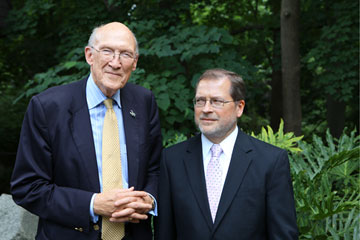
Alan Simpson and Grover Norquist, sans talking points, at the zoo.
(3 of 5)
By the time he made it to the Senate in 1979, he had crafted a new identity that eventually won him the position of Republican whip, which he held for a decade, starting in 1985. "I was a pure legislator," he said. That year at a private speech at the Bohemian Grove, an exclusive playground for corporate bigwigs in Northern California, he laid out his theory of democracy. "In politics, there are no right answers," he said, according to a diary entry he later published, "only a continuing flow of compromises among groups, resulting in a changing, cloudy and ambiguous series of public decisions--where appetite and ambition compete openly with knowledge and wisdom."
Norquist, by contrast, had drawn different conclusions from the conservative revolution, fashioning himself as a pure activist with an ideological North Star: the end of socialism and the final victory of free enterprise. In grade school near Weston, Mass., he remembers arguing with classmates about the merits of the Vietnam War, and at the age of 12 he volunteered for Richard Nixon's 1968 presidential campaign. In the 1980s, after surviving Harvard University as a conservative, he began traveling the world on behalf of think tanks to help organize anticommunist rebels in Afghanistan, Angola and Mozambique. Back in Washington, he joined a small band of Republican ideologues who drew up a generational plan to roll back the social safety net of Franklin D. Roosevelt's New Deal. "My goal is to cut government in half in 25 years, to get it down to the size where we can drown it in the bathtub," he would say.
The two men first came to blows back in 1986, when Simpson led the last major bipartisan immigration-reform effort on behalf of Reagan. Norquist helped launch a conservative revolt against the bill, on the grounds that Simpson's proposed national ID card to verify citizenship was a step toward tyranny. Norquist even went so far as to print fake bar-code tattoo stickers so opponents could dramatize the danger. The torments of those days have not been forgotten. "You were involved with the sticker that said, 'Put this in water and put it on your wrist,'" Simpson said, as the two men reached the Komodo-dragon pavilion, where an 8½-ft.-long venomous lizard makes its home.
"The Simpson-Mazzoli little sticker, yes," responded Norquist.
"I thought about it every night, this son of a bitch," said Simpson. "I've been waiting for this opportunity."
Then he raised his hands, as if he were about to choke Norquist. "Let me tell you, I kept some of them," he said, thinking better of it.
"Oh, good," said Norquist. "I have a bunch."
Some differences can heal over time. Norquist has since become a big supporter of the latest immigration-reform effort in Congress, which Simpson also backs. They both favor more free-trade agreements and would like to entertain means testing for Medicare and cuts to Social Security. Both see it as folly to avoid negotiating with America's enemies--a position taken by the Bush Administration. "I never understood the argument some had, 'Don't talk to Iran or North Korea.' How would it hurt you to talk to them?" Norquist said.
"You feel that way?" asked Simpson, surprised. "I feel that way deeply."
"If they ask you for Wyoming, you say no," advised Norquist.
